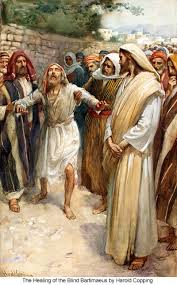HOMILY SUNDAY 30 – B (Homily 01)
Faith to Heal and Follow
(Jer 31:7-9; Psalm 126; Heb 5:1-6; Mk 10:46-52)
***********************************************************
It was mealtime during a flight on a small airline in northern Manitoba. “Would you like dinner?” the flight attendant asked me. “What are my choices?” I asked. “Yes or no,” she replied.
Do you consider yourself a disciple of Jesus? Faith in Jesus heals us and invites us into to discipleship
The gospel today is not only a moving story of healing, but also a powerful reminder of what should follow healing – discipleship. Bartimaeus is not only healed, but he also, and perhaps even more importantly, follows Jesus along the way.
This is a transition passage, preparing for the revealing of the humble Messiah and the true nature of his Messiahship in Jerusalem. So now there is no need for secrecy – when Jesus is acclaimed as Son of David he calls the man to him, heals him and allows him to follow.
This is a miracle of faith leading to sight. The cloak was the blind man’s only status and his permission to beg. He throws it away before Jesus heals him, in faith. We must let go of old securities and embrace the new, the unimaginable.
This miracle of sight is meant to heal his disciples, and us, of our blindness. It takes faith to recognize our own need for healing, to acknowledge the mercy and pity of the Son of David and to follow him in the way of humble discipleship.

Barimaeus blind beggar
Jesus’ question to Bartimaeus is the same as the one earlier to James and John, but Bartimaeus’ answer is so different from their selfish request – he understands much better the authority of Jesus who does not dominate but comes to serve. Unlike them, he is aware of his need and powerlessness and finds Jesus his only hope and desire. He has faith in the healing power of Jesus and is saved in the sense of being given salvation. He not only is healed, but also follows Jesus along the way. For Mark, to follow him means to be on the way of Christian discipleship. Only one of faith, enlightened by Jesus, can walk his way without consternation and without fear
This gospel presents us with a challenge. Are we aware of our own blindness, sin and sinfulness? Where do we need healing? What are our demons, our character defects we must address? How strong is our faith in the power of Jesus to heal us and transform us? Can we throw off whatever restrains us – our fear, false pride and stubbornness – spring up like Bartimaeus and come to Jesus for healing?
What about us as a community? Are we perhaps actually preventing people from coming to Jesus, like the crowd in the gospel? Or are we encouraging them and helping them to find healing and their mission in the Church?
And after healing happens, do we follow Jesus along the way, or do we just take it for granted? When we participate in a Cursillo, or retreat, or pilgrimage, is it just an emotional high for us, with no lasting effect? Or do we return to our families and communities on fire with a love for Jesus expressed through a life of prayer, worship together on Sunday, ministry within the Church, and a mission outside the church of sharing our faith with others and serving our brothers and sisters?
To help us reflect on this, here are a few thoughts entitled:
“Questions that God won’t ask when we die:”
- God won’t ask what kind of fancy car you drove. He will ask how many people who did not have transportation you took to church.
- God won’t ask the square footage of your house. He will ask how many people you helped who didn’t have a house.
- God won’t ask how many material possessions you had. He will ask whether those material possessions dictated your life.
- God won’t ask how much overtime you worked. He will ask did you spend quality time with your family.
- God won’t ask how many promotions you took to chase a dollar bill. He will ask how many promotions you refused to advance your family’s quality of life.
- God won’t ask what your parents did to help you. He will ask what you did to help your parents.
- God won’t ask what you did to help yourself. He will ask what you did to help others.
The Eucharist is both a source of healing and growth for us, and an empowerment for us to go out and follow Jesus along the way, serving our brothers and sisters in need.
So, don’t be part of the crowd – dare to come to Jesus for healing, then follow him along the way.



